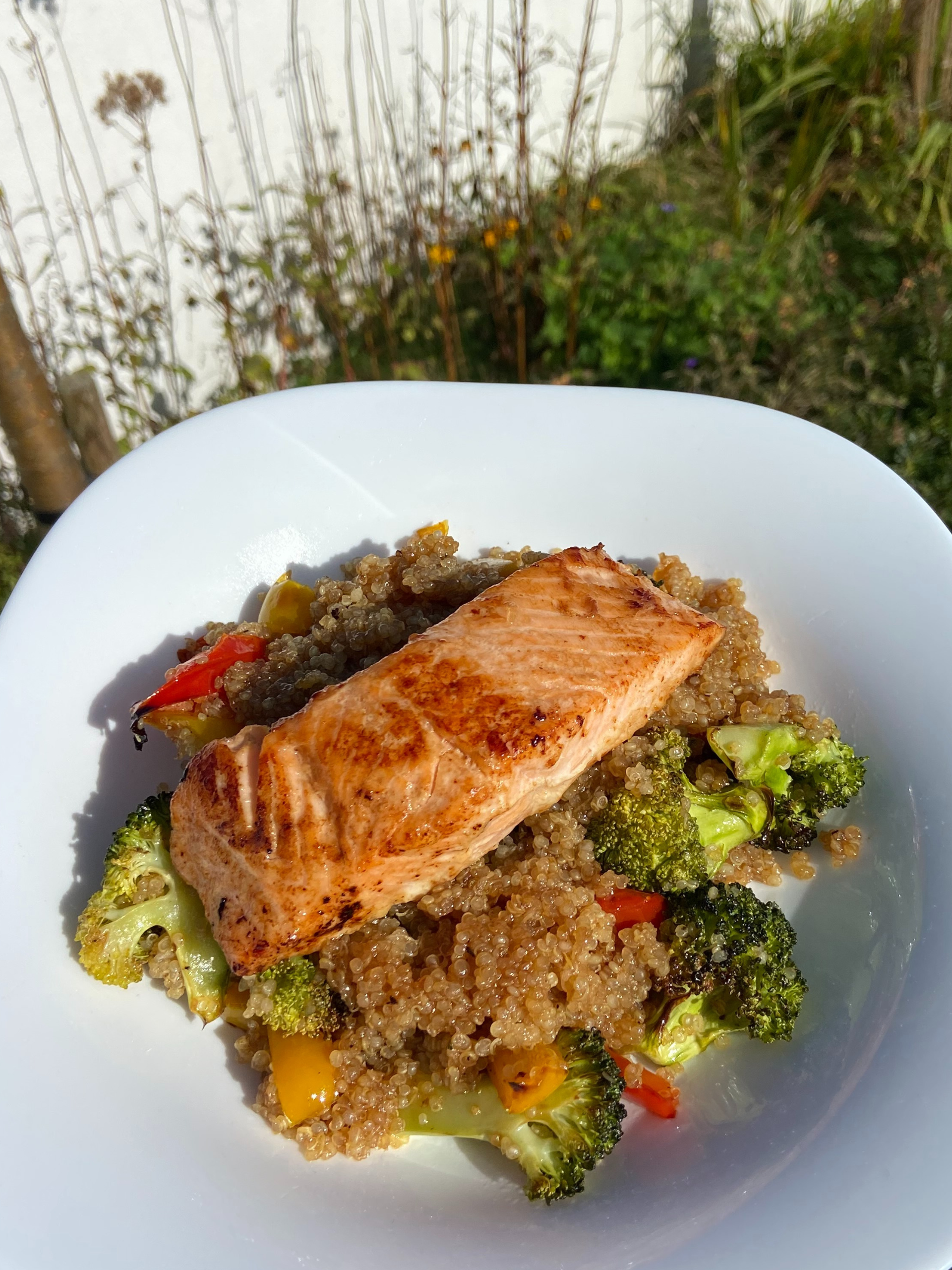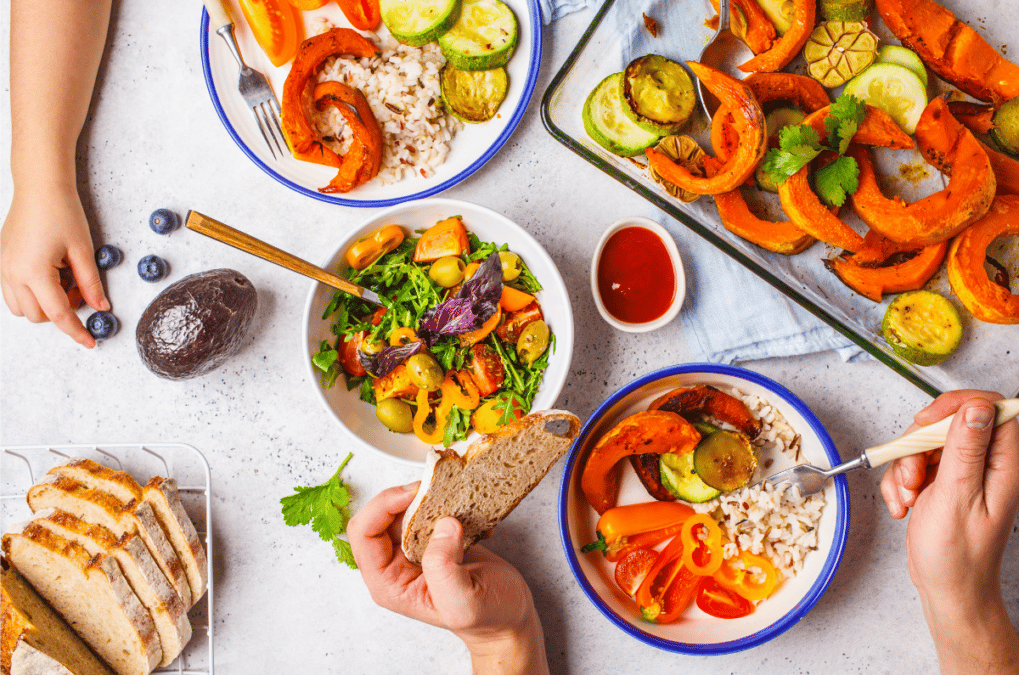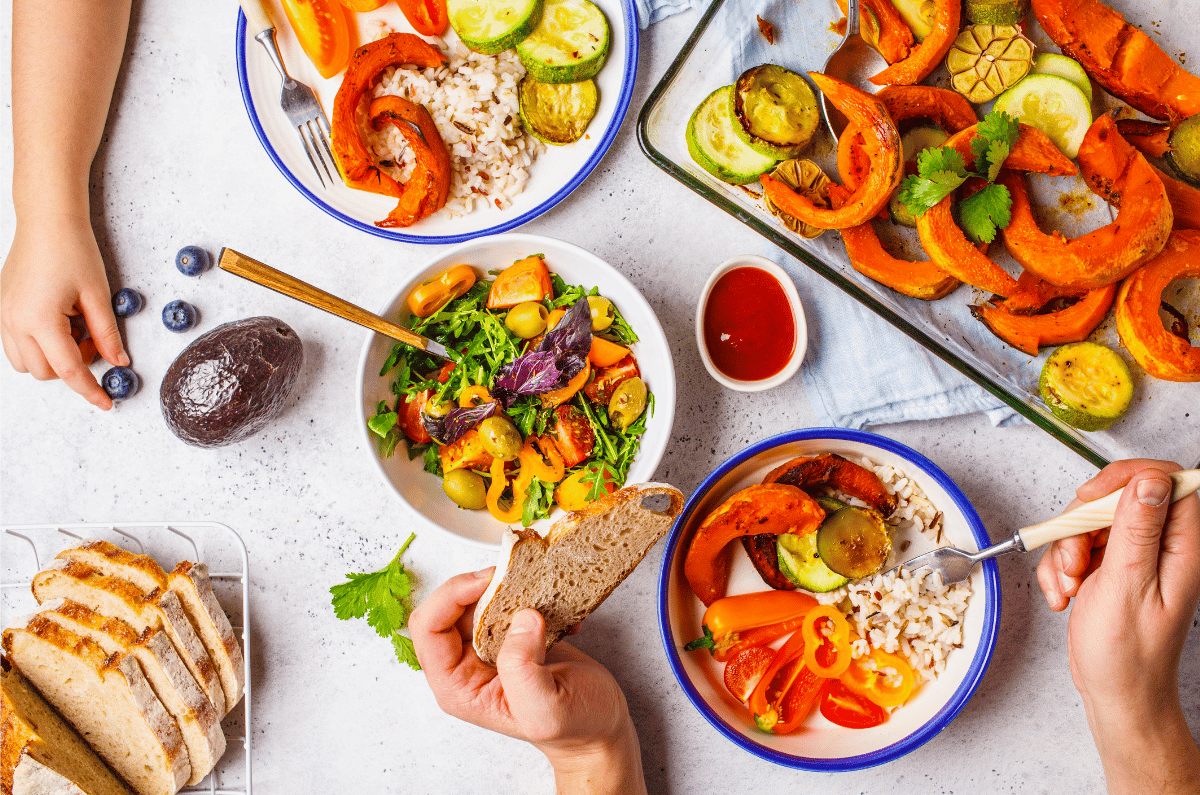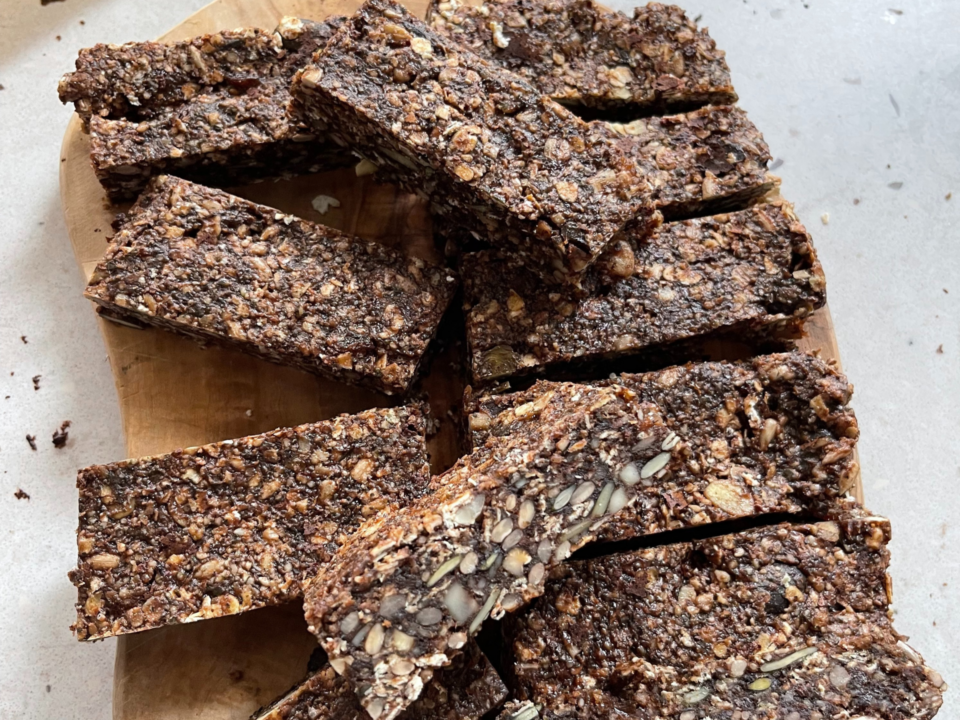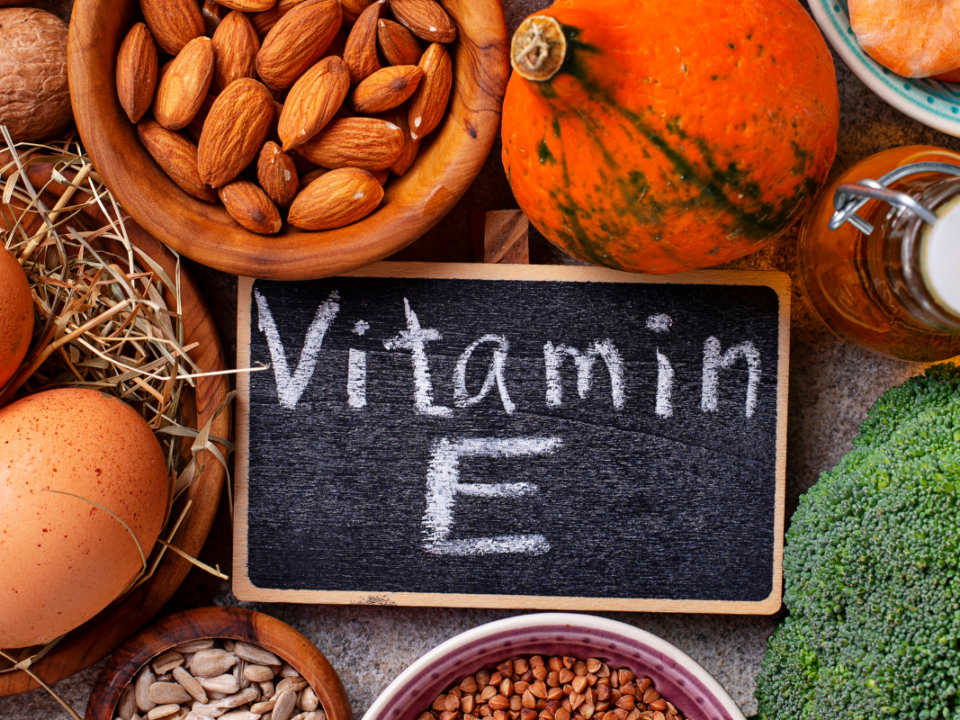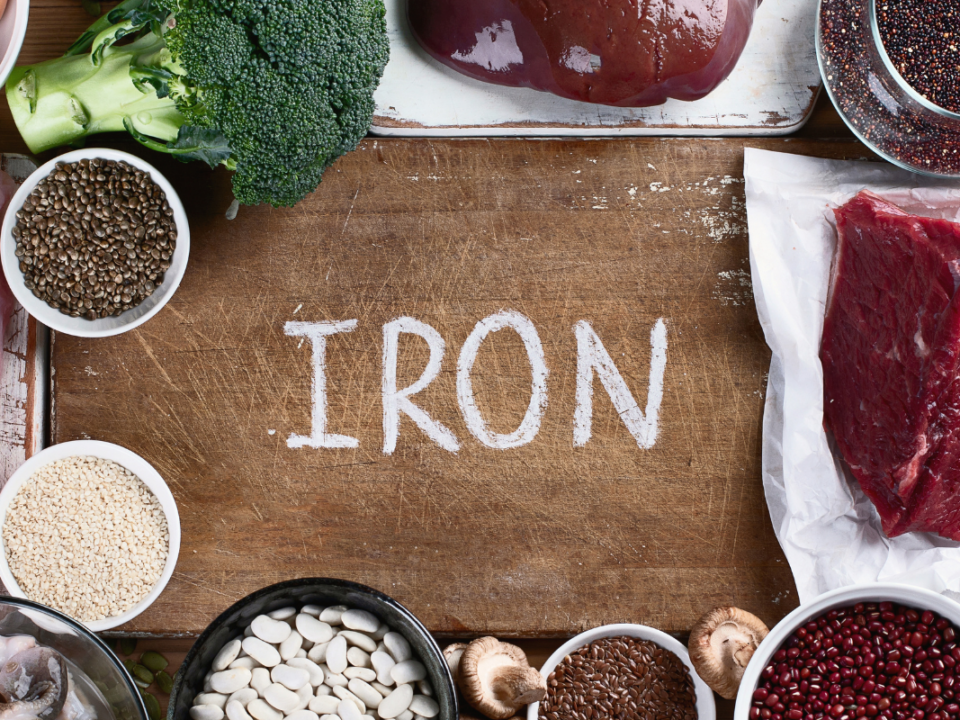In recent years, plant based diets have received a lot of attention with more people sharing their ‘opinions’ and ‘experiences’ around what food and diet is best to support health and performance. When it comes to nutrition, there is a hierarchy of needs that we must meet to achieve optimum health and performance. The fact about it is that it’s not one diet versus another and there is certainly no one size fits all when it comes to nutrition and food. There are pro’s and con’s to each approach and so long as you are well planned, it is possible to meet each of these needs through each dietary dietary approach. To learn more about the hierarchy of nutrition needs, take a read of this article: Performance Nutrition Explained – daveynutrition
We at daveynutrition often get asked about the benefits of plant based diets to health and performance. First let’s understand what plant based diets are. A plant based diet is one that is made up mainly of foods that come from plant sources, such as fruit and vegetables pulses, wholegrains, nuts, seeds and oils. Plant based diets are not necessarily vegan or vegetarian, but they do contain mostly plant derived foods. Your diet could be plant based if you consume a wide variety of different plant foods with a small proportion of your diet from animal sources. Whereas a vegetarian diet does not contain meat, poultry, game, fish or by-products of slaughter and a vegan diet doesn’t contain any products derived from animals.
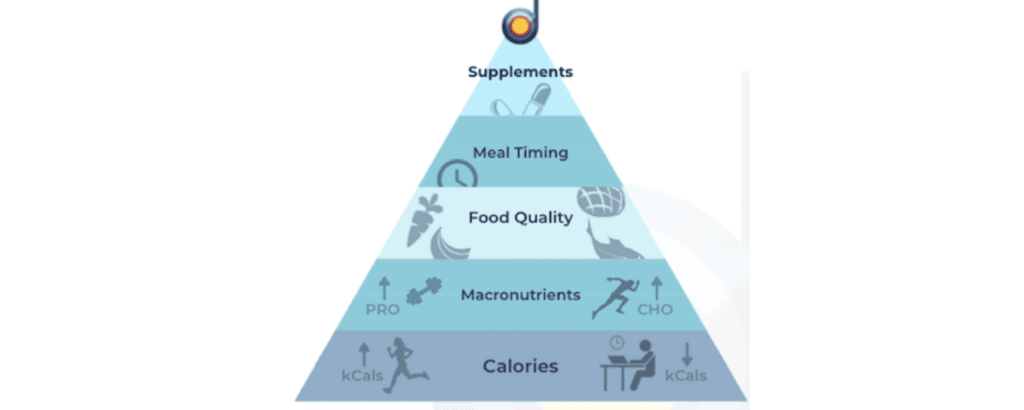
Benefits of plant-based diets
Plant-based diets as well as vegan and vegetarian diets have been shown to have positive effects on our health, with evidence showing a trend towards lower LDL cholesterol, blood pressure and improved digestion for example. In addition, studies have shown reductions in the occurrence of heart disease, type 2 diabetes and some cancers.
A diet rich in plant foods will provide you with an abundance of vitamins and minerals which contain phytonutrients, antioxidants, and anti-inflammatory properties. These nutrients help to support our immune system, recovery, inflammation, and play a role in combating oxidative stress and free radicals in the body. To read more about the benefits of antioxidants, take a look at this article: Antioxidants and Exercise! To supplement or not?
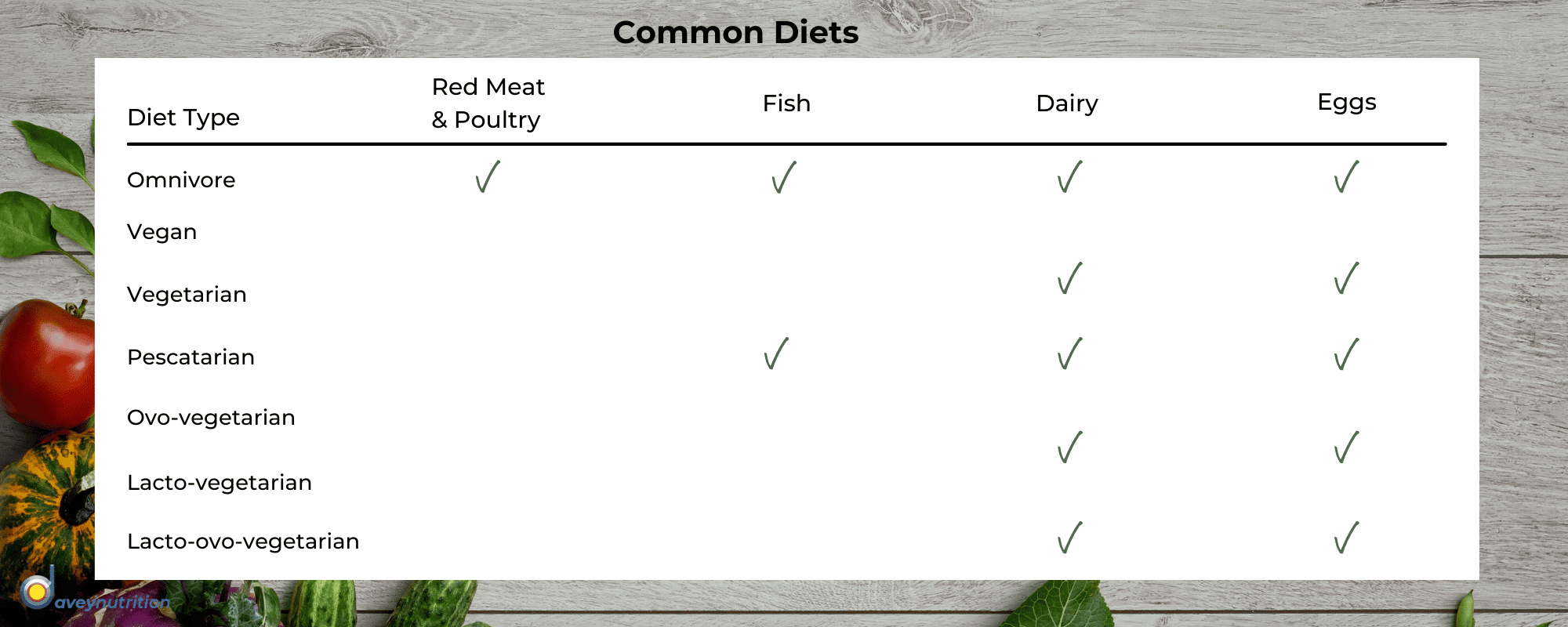
Will a plant-based diet provide me with the protein I need?
Questions often arise around protein from plant based diets, in particular vegetarian diets and even more so vegan diets. To put it simply, yes you can achieve all of the protein that your body needs by following any of these plant-based diets. The key is to adopt a well-planned approach.
The majority of plant-based foods or plant-proteins don’t contain all of the essential amino acids (EAA’s). Therefore vegetarian and vegan diets often lack some of these, particularly methionine, lysine, tryptophan and leucine. EAA’s are the amino acids that cannot be made by the body and they act as protein building blocks in the body. Our body cannot make them, so it is important that we consume these in our diet. There are 20 amino acids in total which make up the building blocks of protein. Protein is then used to support growth and repair and is used in almost every biological process in the body.
A complete protein contains all of the EAA’s that the body needs, but these proteins mainly come from animal sources. The good news is that we can overcome this through our food by combining a variety of protein containing plant foods throughout the day and consuming different sources of these essential amino acids.
Quinoa, hemp, chia seeds, green peas and nuts are some other good sources of protein. I have included some meal plan ideas, combining these among other sources of protein down below.
For more information on plant-based protein sources, be sure to have a read of this article: The truth about vegetarian diets and protein intake

Can I build muscle on a plant based diet?
Yes you most definitely can build muscle on a plant based, vegetarian or vegan diet. Like always, building muscle will require planning, consistently meeting your calorie and protein requirements (including a good variety of the EAA’s) and of course muscle stimulation, ie. resistance training, among other things described in detail here- The key elements of building lean mass.
Many plant-based foods are incomplete protein sources and provide lower total protein per serving compared to animal sources and because of this, it can be more difficult to meet protein requirements. This is why good planning is crucial!
As mentioned above, it is important to consume a variety of protein sources, but particularly those that are required in higher amounts in the body, such as the three branched chain amino acids – leucine, isoleucine and valine.
Leucine is an amino acid of concern when it comes to muscle building as it is essential for the stimulation of muscle protein synthesis. Leucine in particular is often lacking in a vegetarian or vegan diet and is found more in animal sources of protein. Soy beans and lentils are good plant-sources of leucine.
If looking to supplement, there are some good plant-based proteins available. Soy protein is a good source of leucine and unlike other plant based proteins, is a complete protein.

Will a plant based diet help with my fat loss goal?
When it comes to fat loss, the key is to achieve a calorie deficit.
Plant-based diets tend to be rich in fibre from foods such as fruit and vegetables, wholegrains and pulses. Fibre plays a huge role in appetite management because when we consume fibrous rich foods, it bulks up in our digestive tract, taking up more space. The stretch receptors in our stomach recognize this and send signals to our brain that we are full. It also helps to slow down gastric emptying (the rate food leaves our stomach), slowing down our digestion and leaving us feeling full for longer.
These foods also tend to be quite low in calories therefore even when we consume them in larger amounts, we are taking in less calories than we would be if we were consuming the same quantity of chocolate or other energy dense foods. These foods may not always leave us feeling full or satisfied, and if they do, it’s usually not for very long. For this reason, consuming a plant-based diet can support a fat loss goal and help us to sustain it!
Fibre has also been shown to improve the gut microbiome and support a healthy immune system. We have some great articles on the role of fibre and how you can include more fibre into your diet on the website.
Protein will also play a significant role in helping you to reach your fat loss goal. Consuming adequate amounts of protein, spread out over 3-4 meals throughout the day will help you to feel satisfied in a calorie deficit, maintain lean mass while losing fat mass, and balance your blood sugar levels, which helps to limit cravings and dips in energy. And as mentioned, you can consume sufficient protein on a plant based diet, further helping to support your fat loss goal.
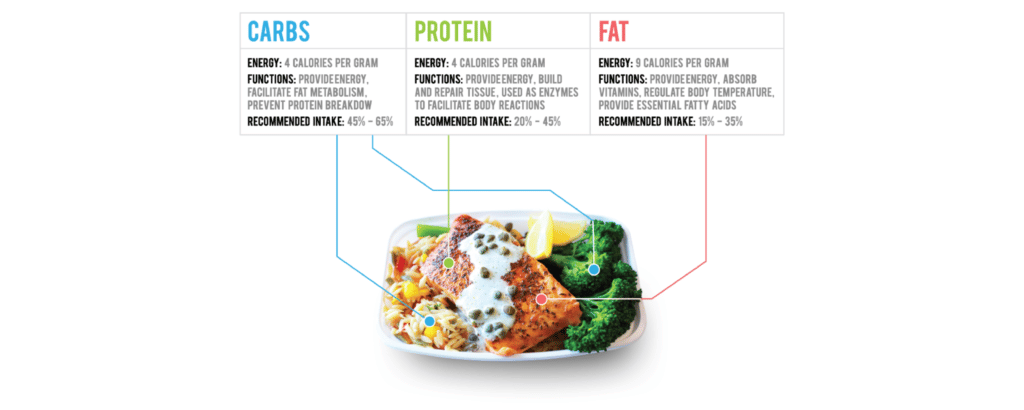
Can I meet my macronutrient recommendations on a plant based diet?
Protein
The recommended intake for active people and athletes is 1.7–2.0g of protein per kg of body mass per day depending on your health or performance goal.
With sufficient planning, these protein targets are achievable through any of the plant based diets mentioned above.
Focus on educating yourself around what plant-based foods are a good source of protein, planning your meals to include protein at each meal and experimenting with different foods, recipes and different protein sources. Most importantly make it enjoyable!
Carbohydrate
Carbohydrate targets will depend on your goal as well as activity levels and body weight.
Performance Nutrition Calculator
However, carbohydrates aren’t usually an issue and can be easily met on a plant based diet as fruit and vegetables, wholegrains, legumes are all great sources of complex carbohydrates. Including legumes and pulses such as beans, lentils and chickpeas, in your diet will provide you with a good source of protein too.
Fat
Fat intakes should make up 20-35% of a person’s calorie intake or another good rule of thumb is, approximately 1g of fat per kg of body weight per day.
Fat can be consumed in all diets from foods such as nuts, seeds and oils. Essential fatty acids are particularly important for supporting our health and cannot be made by the body so we must get them from our diet. Omega 3 can be of particular concern in plant based diets, particularly those that don’t include oily fish. It is important for optimal brain health and function and supports good cardiovascular health. In addition, omega-3 contains anti-inflammatory properties and is known to play a role in muscular development and function, therefore may improve muscle mass gains and strength. If supplementing,
It is recommended that we consume 2 portions of oily fish per week and for those who do not regularly consume oily fish such as salmon and mackerel, plant-based food sources include walnuts, flax seeds and chia seeds. If we are not consuming enough of these fatty-acids through our diet, then supplementation may be a good option to ensure we are consuming between 1-2g of EPA/DHA daily. Click here for more information on Omega-3.
Micronutrients and other considerations
Plant-based foods are generally a great source of vitamins and minerals however, there are certain micronutrients that are difficult to obtain sufficient amounts of despite taking in a well-planned diet of high quality foods. These nutrients in particular tend to be of concern: Omega-3 fatty acids, zinc, iron, iodine, calcium, vitamin B12 and vitamin D. However this is not always the case and a food first approach should be adopted before supplementation is considered. Guidance with a professional is recommended to determine any nutrient insufficiencies that may be present.
Case Study: Transition to a Vegan Diet in an Elite Male Gaelic Football Player
The following is a sample day of eating of a Gaelic football player who was involved in my case study. The table shows a day of eating on an omnivorous diet compared to one year later, when he had adopted a vegan diet.
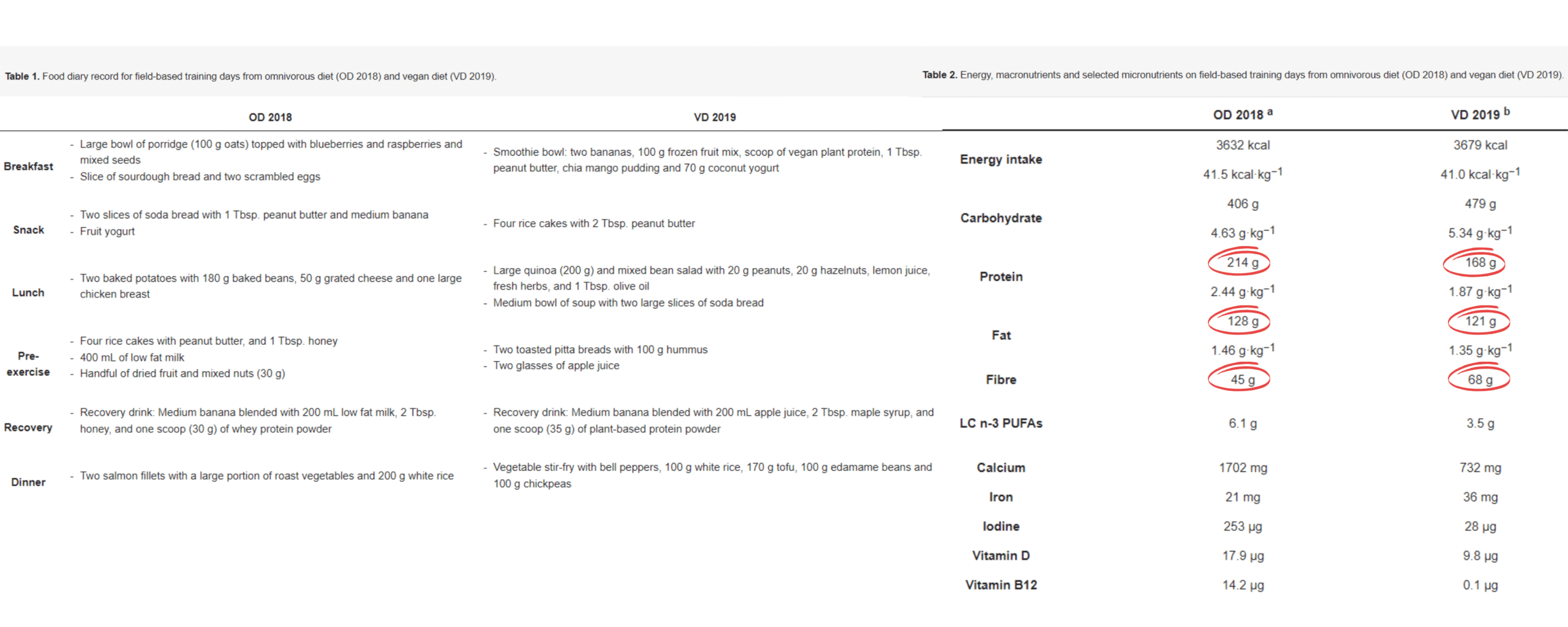
Key Takeaways
There is no evidence to suggest that one diet is better than another. I encourage you not to look at this diet versus that diet, instead focus on the quality of the diet you do consume and ask yourself, is there room for improvement?
Research has shown that a diet that is based primarily on plants has been shown to be optimal for long term health. We at daveynutrition recommend that you focus on consuming adequate energy and nutrients, hitting your 5-7 portions of fruit and vegetables per day while minimizing your intake of processed foods. Look to finding a dietary approach that not only supports your health and performance, but one that you enjoy!
References:
American Dietetic Association, Dietitians of Canada, American College of Sports Medicine, Rodriguez, N. R., Di Marco, N. M., & Langley, S. (2009). American College of Sports Medicine position stand. Nutrition and athletic performance. Medicine and science in sports and exercise, 41(3), 709–731.
Barnard N.D., Goldman D.M., Loomis J.F., Kahleova H., Levin S.M., Neabore S., Batts T.C. Plant-Based Diets for Cardiovascular Safety and Performance in Endurance Sports. Nutrients. 2019;11:130. doi: 10.3390/nu11010130.
Craig W. J. (2009). Health effects of vegan diets. The American journal of clinical nutrition, 89(5), 1627S–1633S. https://doi.org/10.3945/ajcn.2009.26736N
Davey, D., Malone, S., & Egan, B. (2021). Case Study: Transition to a Vegan Diet in an Elite Male Gaelic Football Player. Sports (Basel, Switzerland), 9(1), 6. https://doi.org/10.3390/sports9010006
Kerksick, C. M., Wilborn, C. D., Roberts, M. D., Smith-Ryan, A., Kleiner, S. M., Jäger, R., Collins, R., Cooke, M., Davis, J. N., Galvan, E., Greenwood, M., Lowery, L. M., Wildman, R., Antonio, J., & Kreider, R. B. (2018). ISSN exercise & sports nutrition review update: research & recommendations. Journal of the International Society of Sports Nutrition, 15(1), 38. https://doi.org/10.1186/s12970-018-0242-y
Lynch H., Johnston C., Wharton C. Plant-Based Diets: Considerations for Environmental Impact, Protein Quality, and Exercise Performance. Nutrients. 2018;10:1841. doi: 10.3390/nu10121841.
McGlory, C., Calder, P. C., & Nunes, E. A. (2019). The Influence of Omega-3 Fatty Acids on Skeletal Muscle Protein Turnover in Health, Disuse, and Disease. Frontiers in nutrition, 6, 144.
Rogerson D. (2017). Vegan diets: practical advice for athletes and exercisers. Journal of the International Society of Sports Nutrition, 14, 36. https://doi.org/10.1186/s12970-017-0192-9
Thomas, D. T., Erdman, K. A., & Burke, L. M. (2016). Position of the Academy of Nutrition and Dietetics, Dietitians of Canada, and the American College of Sports Medicine: Nutrition and Athletic Performance. Journal of the Academy of Nutrition and Dietetics, 116(3), 501–528. https://doi.org/10.1016/j.jand.2015.12.006


